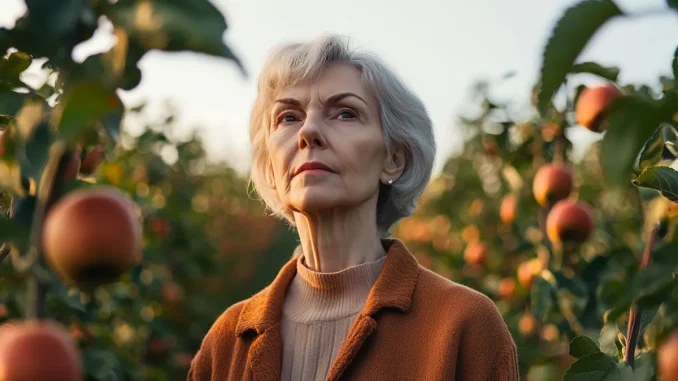
The orchard glowed in the golden light of sunset as I walked between the rows, brushing my hand along the same trees my husband, John, planted 47 years ago. He’d been gone five years now, and I’d tended them alone ever since. They were our legacy. Or so I thought.
At the old bench, our initials—L + J—still carved into the oak, I sat with memories. The world moves on, even when your heart begs it not to.
That evening, my son Brian arrived in his usual cloud of dust, holding another offer to sell the orchard. “It’s good money,” he said. “You could get a condo in town.” I told him what I always did: “I’m not ready.” He meant well, but didn’t understand—leaving this place would feel like losing John all over again.
A few days later, I found a boy—skinny, dirty, scared—stealing apples. “You hungry?” I asked. He said his name was Ethan. His arms were bruised, and his words quiet: “This place feels safe.” I started leaving food by the tree. One day, I handed him gloves. “If you’re going to eat my apples, might as well help pick ‘em.”
We worked side by side. He learned quickly. “Trees remember everything,” he said once. I realized then—this orchard wasn’t just memory. It could be hope.
Then Brian came again, this time with Mr. Granger, pressuring me to sell. “You’ll be safer,” Brian insisted. I looked out at the trees swaying in the breeze. “I’m not alone,” I said, watching Ethan in the distance.
That night, Ethan left a small wooden apple on my porch, carved with our initials: L + J. “I heard what they said,” he admitted. “If you sell this place, there’s nowhere else like it.”
So, I ran the numbers. They didn’t look good, but maybe the orchard didn’t have to be sold—maybe it just needed a new purpose.
A few days later, I told Brian and Mr. Granger under the old oak: “I’m not selling.” I showed them my ideas: community events, classes, a small farm stand. Mr. Granger walked off. Brian stayed. “You’re serious?” he asked. “I am.” He looked at my plans and smiled. “Then let’s do it.”
The town came to life. Neighbors brought tools and pie. Brian helped rebuild the barn. Ethan’s mother, Maria, joined us too—grateful for how the orchard changed her boy.
By spring, we held our first community day. Families picked apples. Kids played. The orchard wasn’t just surviving—it was thriving.
That summer, I sat on the porch watching Ethan teach younger kids to plant saplings. Brian arrived, basket in hand. “You were right, Mom,” he said.
Later, under the old oak, I handed Ethan a carving knife. “Want to learn something new?” I asked. He carved a small E next to L + J.
“For continuity,” I told him.
“What’s that mean?”
“It means stories don’t end. They change.”
I had thought I was holding onto the past. But I was really planting a future.
Leave a Reply